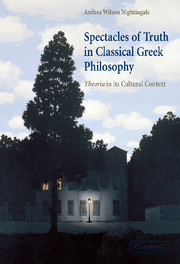Book contents
- Frontmatter
- Contents
- Acknowledgments
- Introduction
- 1 Theoria as a cultural practice
- 2 Inventing philosophic theoria
- 3 The fable of philosophy in Plato's Republic
- 4 Theorizing the beautiful body: from Plato to Philip of Opus
- 5 “Useless” knowledge: Aristotle's rethinking of theoria
- Epilogue: “Broken knowledge”? Theoria and wonder
- List of references
- Index of passages cited
- General index
Introduction
Published online by Cambridge University Press: 22 September 2009
- Frontmatter
- Contents
- Acknowledgments
- Introduction
- 1 Theoria as a cultural practice
- 2 Inventing philosophic theoria
- 3 The fable of philosophy in Plato's Republic
- 4 Theorizing the beautiful body: from Plato to Philip of Opus
- 5 “Useless” knowledge: Aristotle's rethinking of theoria
- Epilogue: “Broken knowledge”? Theoria and wonder
- List of references
- Index of passages cited
- General index
Summary
Think of the long trip home./ Should we have stayed home and thought of here? Where should we be today?/ Is it right to be watching strangers in a play/ in this strangest of theatres?/ What childishness is it that while there's a breath of life/ in our bodies, we are determined to rush/to see the sun the other way around?
Elizabeth Bishop, “Questions of Travel”Questioning attains its own ground by leaping.
Heidegger, Introduction to MetaphysicsItalo Calvino's dazzling book, Mr. Palomar, offers a portrait of postmodern ways of seeing. Its hero, Mr. Palomar – named after a famous telescope – spends his time conducting experiments in viewing and contemplating the world around him. In a chapter entitled “The Contemplation of the Stars,” Palomar ventures out to look at the heavens “in order to detach himself from the earth.” In this endeavor, Palomar deliberately follows the example of the ancient Greeks who, he believes, achieved knowledge and tranquillity from this exercise. He goes to the darkness of a nearby beach and, after spending half an hour perusing his astronomical charts, settles down to study the stars.
This activity, however, turns out to be quite complicated: “to decipher a chart in the darkness he must also bring along a flashlight. The frequent checking of sky against chart requires him to turn the light on and off, and in the passages from light to darkness he remains almost blinded and has to readjust his vision every time” (43).
- Type
- Chapter
- Information
- Spectacles of Truth in Classical Greek PhilosophyTheoria in its Cultural Context, pp. 1 - 39Publisher: Cambridge University PressPrint publication year: 2004

